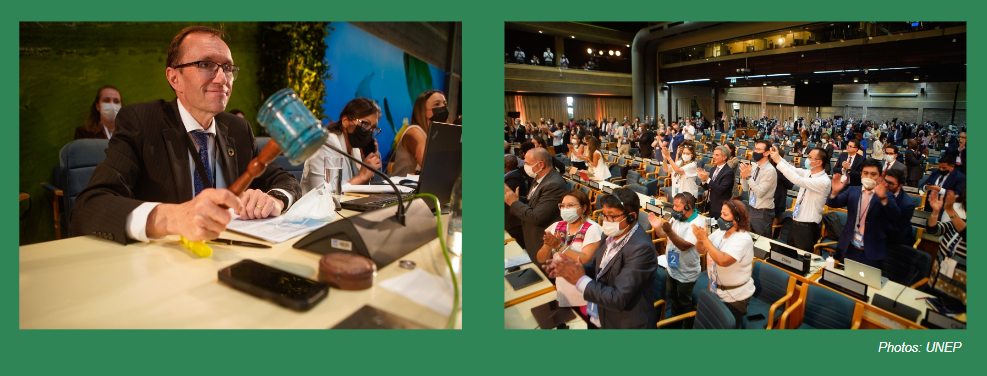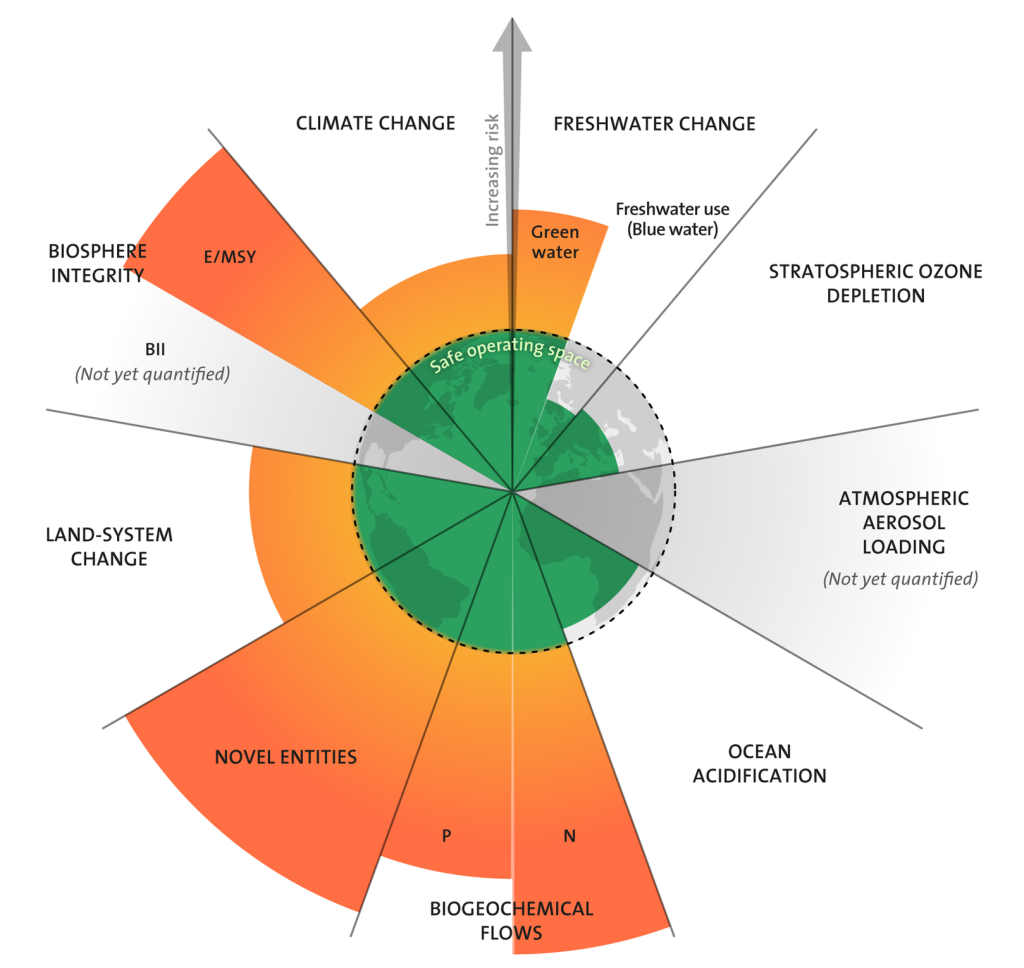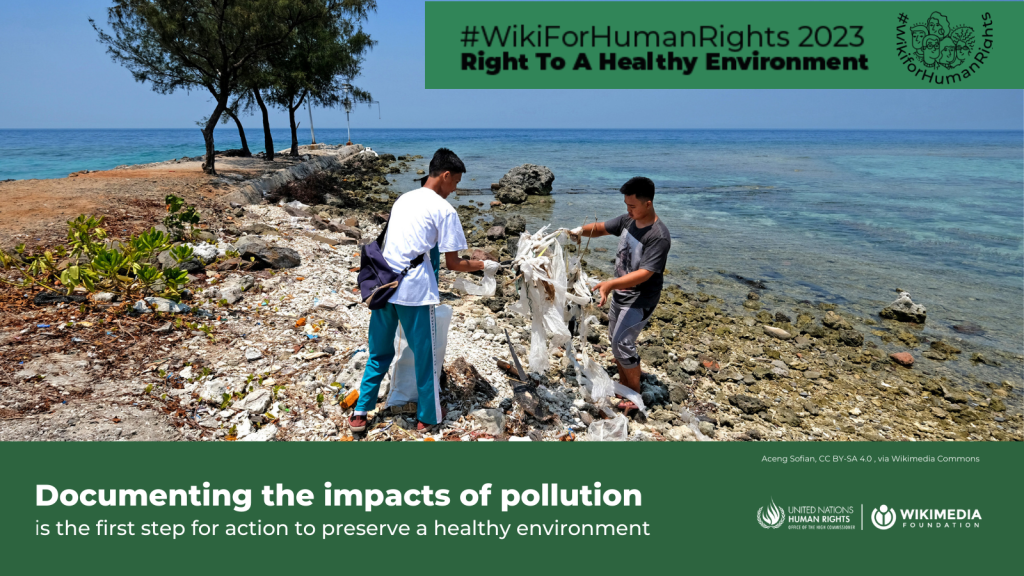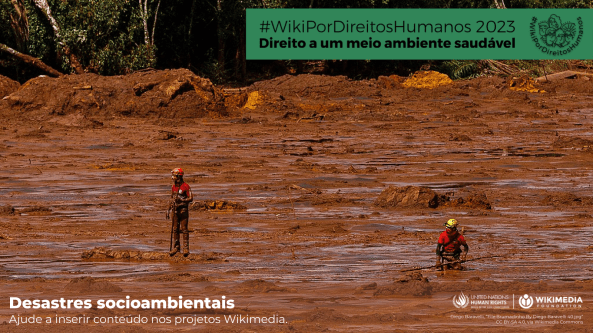The first few months of this year have felt like de ja vu with crises on repeat: concerns sparked by the COVID 19 pandemic have been further heightened by forest fires, droughts and heatwaves across the world. Everywhere you look there are constant reminders that humanity continues to run headfirst into not one, but three environmental crises, or a triple planetary crisis, of climate change, pollution and biodiversity loss.
At the same time that we are living through these crises, knowledge gaps on environmental degradation and disinformation exploiting those gaps threaten our ability to build collective action and change. To respond to the urgent need for relevant information on the triple planetary crisis, the Wikimedia movement has run the #WikiForHumanRights campaign in partnership with UN Human Rights since 2019, to catalyze collective action in bridging the glaring knowledge gaps that exist on one of the world’s biggest encyclopedias. You too can help contribute to growing our content on climate and sustainability at a time when the world needs relevant information.

Photos from the UN negotiations on the international plastics treaty, one of several pollution treaties currently under consideration by the international community.
This year’s campaign celebrates Earth Day (April 22) and World Environment Day (June 5) with a writing contest focused on pollution and its human implications. To close this knowledge , we need your help. We want you to be part of creating the connection between international action and local knowledge. One way to get involved is by watching the launch webinar for this year’s campaign to learn more about the intersection of human rights and pollution. Watch it here.
In addition to joining events, you can play an active role in bridging the content gaps that exist across the Wikimedia projects. Wikimedia projects are a key part of building a public archive of the environmental crises and the effect on our humanity. This year’s campaign is a chance for us to remember and contribute to Wikimedia because contributing to public knowledge allows us, as individuals, to actively contribute to the positive change needed to avert the triple planetary crises.
Why would Wikimedia projects be part of the solution for environmental crises?
In public health and environmental science, the precautionary principle drives many of the warnings given by experts to avoid creation, dissemination or exposure to potentially harmful chemicals and toxins. In the search of profit or the next industrial convenience, our industrial systems embrace technology (like leaded gasoline, fossil fuels, plastics, or any number of other chemicals), without disclosing or investigating the long term consequences that deploying certain products can bring to people, the environment, or ecosystems. We act without the public knowledge we need to make collective informed decisions.
Far too often, our collective knowledge advances far quicker on ways to create and distribute novel chemicals and other waste materials, rather than on understanding their impacts on the public and the environment. Take for example, the coverage of chemistry topics on Wikipedia: the content includes deep, broad coverage of the various chemicals produced through industrial processes, but a quick review of these articles finds limited health and safety information, except around well understood chemicals of public concern (such Agricultural chemicals, Cyanide, PFASes, or Lead).

We are far exceeding the use of environmental resources, especially with chemicals and pollution, as depicted here in the planetary boundaries model. (Source)
A 2022 literature survey of “novel entities”,chemicals created by humans that don’t exist in nature, found these to be in the environment at levels well beyond the ability of natural systems to handle. We have distributed waste from human industry in every corner of the world. For example, scientists are finding plastics in the deepest oceans and the most remote soil systems, with lasting consequences on soil health. Not only do these harm our environment, but as these plastics degrade in our ecosystems and waterways, the effects become more and more complex, and less understood.
To be relevant in the face of environmental crises, Wikimedia projects must highlight how our collective choices effect humans and the environment. We know that these pollutants will have effects on humans and the environment for generations to come, even if we don’t yet understand how – bridging the knowledge gap on Wikipedia allows us to track these changes in ways that are accessible to broad, impacted audiences.
Breaking news reminds us how important it is to have a trusted source of public knowledge

We often think of plastic pollution as the waste left-over and polluting our oceans, but plastics like other modern industrial processes often has big human rights and environmental consequences both before and after their use. (Source)
In the face of an environmental chaos, Wikimedia projects excel at helping us collectively witness crises and create a lasting memory of our response.
When first thinking about this post two months ago, one of the worst toxic releases in recent US history of vinyl chloride and several other chemicals was unfolding in the United States: a train carring hazardous material derailed near East Palestine in Ohio on 3 February 2023.
The East Palestine crash is not exactly surprising. Vinyl chemistry is used to create one of the oldest manufactured plastics, PVC. Its base chemical, Vinyl chloride is widely used and distributed for manufacturing, is known to be highly reactive in the environment, and have high environmental and human health consequences of exposure. Not surprisingly, the spill happened in an economically disadvantaged community and national and international press coverage was slow.
However, the press quickly became viral, and as the public sought to understand the event, there were more than 500 thousand pageviews to Wikipedia articles about the chemical and the page about the event saw over a million visits.
Every time a major environmental or health disaster happens, we see similar patterns – the public desires accurate, up-to-date information on environmental crises and pollution. Inevitably, in these crises, the companies responsible, government institutions and academics are not ready or always able to provide it. Wikimedia projects allow us to quickly build these connections in public knowledge when people are seeking relevant, factual information.
In capturing history in the making we have the opportunity to highlight the stories most missed
A picture of workers recovering from the Brumadinho dam disaster in 2019 in Brazil; the disaster released tons of mine waste contaminating waterways and local communities. Wikimedia communities brought photographers to the site to document it (Source)
History has shown us that the communities most affected are almost always indigenous peoples, racialized communities, and those in the Global South, and those left out of the economic benefits of these industrial goods (see reports by the UN Special Rapporteur on Toxics and Human Rights).
In the weeks on either side of the Ohio train crash, widespread pollution problems were visible in the news across the globe: a report by Bloomberg that shows pollution in the Amazon affecting mostly indigenous rural communities around an Aluminium mine; a report on plastic pollution from waste from the fashion industry in Kenya polluting the urban settlements and waterways of Nairobi; a study in Australia found more death from air pollution; and the US was rocked by political controversy related to indoor air pollution cause by gas stoves. These are some of the stories that crossed my news feeds, but of course there are many more. Many more stories remain untold.
As a cultural historian, it has always been important to me to have both the answers for environmental crises that we experience in the news, and to create a public memory of just how many times these kinds of accidents happen and affect marginalized communities. As a volunteer Wikipedia editor, one of the most important articles I worked on was documenting the 2015 Gold King Mine waste water spill in Colorado. The mine waste water spill polluted the water of all of the Western States in the United States, and prevented access to water for the Navajo Nation.
Whilst the disaster has quickly left the public eye, the lasting impacts on both the rural communities in Colorado, especially Tribal Nations downstream of the disaster, were profound. Having a persistent, public record of that breaking news on Wikipedia provides more than 3000 visits a month, and that spikes when events like the recent legal settlements.
Pollution, like climate change and biodiversity loss, are not only environmental crises, but human rights crises most frequently violating the rights of the most vulnerable that have lasting legacy.
If you are reading this blog post — you can act
Building lasting public knowledge about topics key to our society, health, and human rights is fundamental for a sustainable future. Wikipedia is the foundation for knowledge online. Building knowledge in local languages and building an archive of how human choices are having long-lasting systemic global, human impacts on nature, humans, and communities.
A healthy environment and the knowledge to protect it are human rights. By building public knowledge you too can act in the face of crises:
- Share the #WikiForHumanRights Campaign
- Participate in the international writing contest or local community events
- Connecting Environmental and Human Rights knowledge organizations with Wikimedia Communities in your context
As you celebrate Earth Day and World Environment Day, ask yourself: how am I working to protect our right to a healthy environment? How am I making sure we build a public memory and the knowledge needed to create a sustainable future?

Can you help us translate this article?
In order for this article to reach as many people as possible we would like your help. Can you translate this article to get the message out?
Start translation
